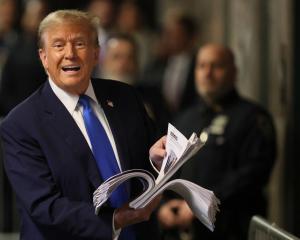The footage showed Jang on the frontrow of top military officers who accompanied Kim Jong-un, the youngest son of Kim Jong-il and his anointed successor, paying their respects before Kim's body.
The choreography around Kim's death is one of the secretive North's few clues to the emerging configuration of power in this poor and isolated state that has rattled neighbours with nuclear tests and military brinkmanship.
A Seoul official familiar with North Korea affairs said it was the first time Jang has been shown on state television in a military uniform. His appearance suggested that Jang has secured a key role in the North's powerful military, which has pledged its allegiance to Kim Jong-un.
North Korea announced last week Kim Jong-il had died of a heart attack on December 17. His body is lying in state in a mausoleum in Pyongyang. He was believed to be 69.
Kim Jong-un was hailed by state media yesterday as "supreme commander" of the North's 1.1 million-strong armed forces, the title held by his father.
A senior source told Reuters this week Pyongyang will shift from a strongman dictatorship to a coterie of rulers including the military and Jang, Kim Jong-un's uncle.
Jang married the daughter of the country's revolutionary founder, Kim Il-sung, in 1972, joining the ruling family that has forged its own form of dynastic rule.
In Beijing, Prime Minister Yoshihiko Noda told Chinese Premier Wen Jiabao that their two countries shared a stake in preserving stability in North Korea in a "new phase."
"The death of Secretary-General Kim Jong-il has brought East Asia to a new phase," Noda told Wen at the start of bilateral talks in China's capital.
"Peace and stability of the Korean peninsula is in a common interest for both Japan and China," Noda told Wen.
"I believe it is timely that we can exchange views and information on this matter with China, which is the chair country of the six-party talks and has the biggest influence on North Korea."
Noda is the first regional leader to visit Beijing since Kim Jong-il's death was announced, leaving his young son Kim Jong-un as leader of North Korea, which has rattled the region with nuclear tests and military confrontation.
China is North Korea's sole major economic and diplomatic partner, and the United States and its regional allies have long pressed Beijing to use its influence to rein in Pyongyang.
China has also hosted the six-party talks, which have sought to coax North Korea into abandoning its nuclear arms ambitions in return for aid and security steps.
Those talks bring together North and South Korea, the United States, Japan, Russia and China.
Constraining North Korea is especially important for Japan, which is well within range of the North's long-range missiles and wants Pyongyang to resolve the emotive issue of the fate of Japanese citizens kidnapped to help train spies decades ago.
"I hope we can sincerely exchange views on how to overcome abduction, nuclear and missile issues," Noda told Wen, referring to North Korea.












